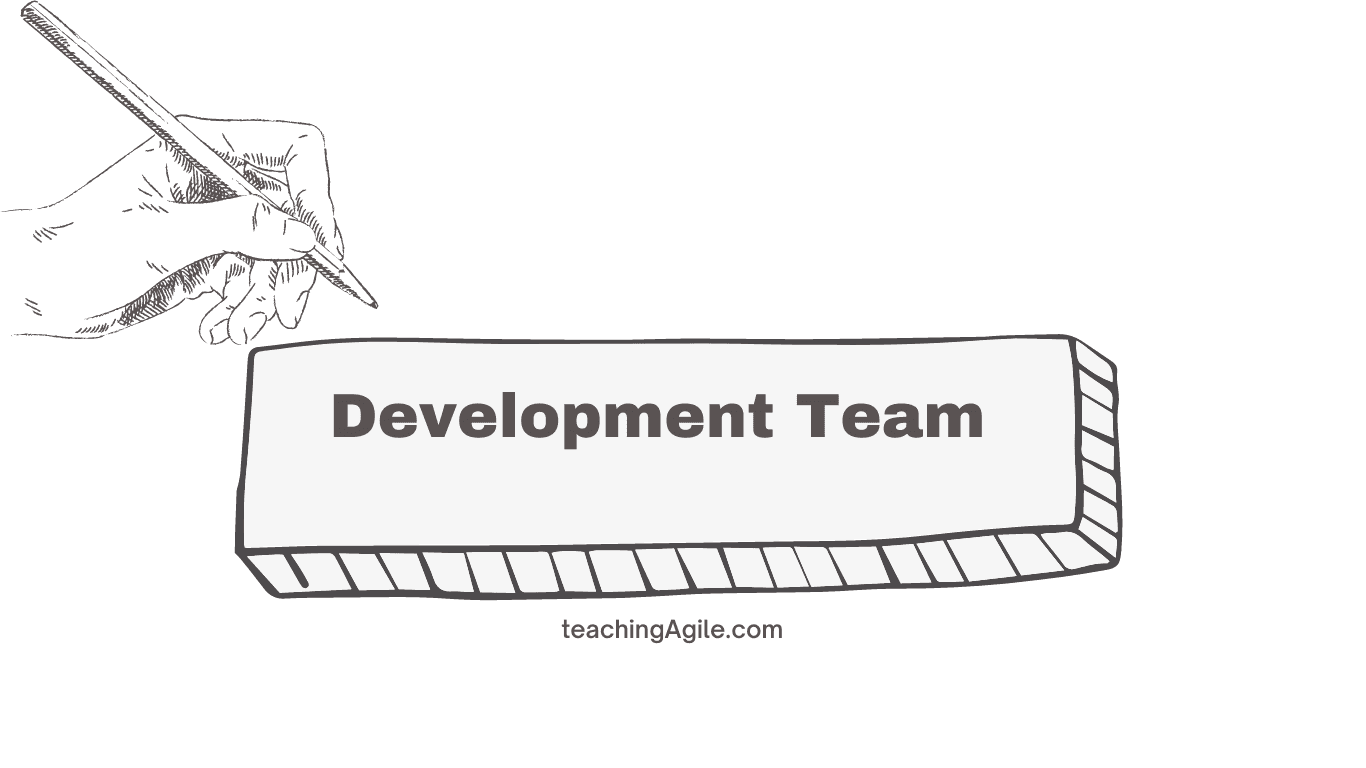
Scrum Role: Development Team
 Scrum Role: Development Team
Scrum Role: Development Team
In Scrum, Developers are the people who do the work. Not just software developers - anyone committed to creating a usable Increment each Sprint.
This could include programmers, testers, designers, UX specialists, database administrators, technical writers, or operations engineers. The key is that they're cross-functional (possess all skills needed) and self-organizing (decide internally who does what).
Along with the Product Owner and Scrum Master, Developers form one of three accountabilities in the Scrum Team.
This guide explores what makes Developers effective, how they collaborate, and how they deliver valuable products iteratively.
Quick Answer: What Do Scrum Developers Do?
| Accountability | Description |
|---|---|
| Creating the Increment | Deliver a potentially releasable Increment that meets the Definition of Done each Sprint |
| Sprint Planning | Select Product Backlog items for the Sprint and create a plan (Sprint Backlog) to achieve the Sprint Goal |
| Daily Collaboration | Self-organize to inspect progress toward the Sprint Goal and adapt the plan as needed |
| Quality Assurance | Ensure all work meets the Definition of Done and quality standards |
| Continuous Improvement | Adapt processes, tools, and skills to improve effectiveness and product quality |
Table Of Contents-
The Development Team: Who They Are
Definition of the Development Team
The Development Team is one of the three main roles in a Scrum Team, along with the Product Owner and Scrum Master.
The team is made up of cross-functional individuals who are responsible for delivering a potentially releasable Increment independently at the end of each Sprint.
💡
The team is self-organizing and has no hierarchy within itself.
Members may have different skills, but they work together to achieve a common goal.
They are accountable for creating high-quality deliverables that meet the business needs defined by the Product Owner.
Size and Composition of the Development Team
Scrum Teams should be small enough to remain nimble but large enough to complete significant work within a Sprint. The recommended size for a Development Team is between 3 to 9 members, with 7 being an average number.
The team should be made up of individuals with different skills, such as developers, testers, designers, and product specialists.
It's crucial that all members have complementary skills so that they can cover all aspects of development.
Characteristics of Successful Development Teams
Successful Development Teams share several characteristics.
- Highly collaborative - Team members respect each other's opinions and ideas and communicate effectively to achieve common goals.
- self-organizing - Members take responsibility for their work and adapt quickly when there are changes in requirements or priorities.
- Technical expertise - Each member has unique technical skills that contribute to delivering high-quality results within time constraints.
Successful Development Teams in Scrum projects consist of cross-functional individuals who possess strong collaboration skills combined with excellent technical knowledge relevant to their role in software development process methodology.
Development Team Responsibilities
The Development Team consists of cross-functional professionals who work together to design, build, test, and deliver the product. The main responsibilities of the Development Team include the following:
-
Creating the Increment: The Development Team is responsible for delivering a potentially releasable Increment of the product at the end of each Sprint, ensuring that it meets the Definition of Done and provides value to the customers and stakeholders.
-
Collaborating on work: The Development Team members work together closely, sharing knowledge, skills, and expertise to effectively design, build, and test the product.
-
Managing the Sprint Backlog: The Development Team is responsible for selecting the work from the Product Backlog during Sprint Planning, creating the Sprint Backlog, and updating it throughout the Sprint to reflect the current status of the work.
-
Participating in Scrum events: Development Team members actively participate in Scrum events such as Sprint Planning, Daily Scrum, Sprint Review, and Sprint Retrospective, contributing their insights, discussing progress, and collaborating on improvements.
-
Continuously improving: The Development Team continuously seeks opportunities to improve their processes, tools, and skills, fostering a culture of continuous learning and growth.
Importance of the Development Team Role
The Development Team plays a critical role in the success of a Scrum team by:
- Collaboratively creating high-quality, valuable products that meet the needs of customers and stakeholders.
- Actively participating in Scrum events and contributing to the continuous improvement of the team's processes and practices.
- Embracing a cross-functional and self-organizing approach, taking ownership of their work, and collaborating effectively to deliver the best possible outcomes.
A skilled and dedicated Development Team can significantly impact the effectiveness and success of a Scrum team, enabling them to deliver products that delight customers and generate positive outcomes for the organization.
Challenges Faced by Development Teams
Conflicts Within the Team
While working together as a Scrum Team in a scrum project, conflicts within the Development Team are inevitable, and it is essential to address them before they affect productivity and morale.
In many cases, conflicts arise due to personality clashes or differences in work styles.
It can also be due to overestimating or underestimating the skills and capabilities of individual team members.
To solve conflicts within the team, it is crucial to encourage open communication channels and establish ground rules for resolving disputes.
Conflict resolution should be done tactfully, considering each person's strengths and weaknesses. An agile Scrum Team should aim at resolving issues amicably so that everyone can work together towards a common goal.
Difficulty in Estimating Work Effort
Estimating how long each task will take is one of the most challenging responsibilities of an agile Scrum Team.
Members may have varying opinions on how long a task will take or what resources are needed to complete it.
These disagreements can lead to delays in delivering the product increment at the end of each sprint.
To overcome this challenge, regular communication between team members is essential.
The Development Team should also prioritize tasks based on their complexity level and ensure that everyone understands their roles and responsibilities well before starting work on any project.
Changing Requirements
In an Agile environment like Scrum, changing requirements are inevitable. The Product Owner may change priorities that require specific tasks to be completed first or add new features midway through development.
Changes like these can affect planning efforts by making estimates invalid for completing tasks within a given time frame.
To manage changing requirements efficiently, an agile Scrum Team needs to be flexible enough to adapt quickly while still meeting deadlines set during sprint planning meetings.
It's crucial for all team members to stay focused on the product vision and work together to create a workable solution within the given time frame.
Additionally, it's important to communicate any changes to the other Scrum Team roles and stakeholders promptly.
While conflicts within the team, difficulty in estimating work effort, and changing requirements are significant challenges faced by Development Teams in Scrum projects, they can be overcome with effective communication skills and a willingness to adapt quickly.
A well-functioning agile Scrum Team should prioritize finding solutions for these issues while still delivering a high-quality product increment at every sprint review.
Tips for Building a Strong Development Team
- Recruiting Diverse Talent - The success of a Scrum Team in a scrum project largely depends on the team's strengths, competencies, and diversity. Recruiting diverse talent is an essential strategy that can help build not just a competent team but also a strong one that can deliver quality work products.
- Encouraging Continuous Learning and Improvement - Continuous learning is essential when it comes to being part of a successful Scrum Team. In agile development projects, everything moves quickly: requirements change fast; technology evolves rapidly; competition grows fiercer than ever before.
- Fostering a Culture of Open Communication - Effective communication is paramount to the success of a Scrum Team in scrum projects. Open communication fosters collaboration, cooperation, and helps build trust between team members. During agile development, it's necessary for the Development Team to communicate regularly, openly, and honestly about sprint progress or any issues that arise along the way.
Conclusion
A Scrum Team forms the engine of the Scrum framework, driving the design, development, and delivery of product increments.
The unique structure of the team, rich in diverse roles and skills, enables it to handle complex tasks in an efficient, collaborative manner.
The cross-functional nature of Scrum Teams, coupled with their self-managing style, are key factors that enable them to adapt swiftly and effectively to changes, promoting agility in product development.
Quiz on Development Team in Scrum
Your Score: 0/6
Question: What is a characteristic of a Scrum Development Team?
Continue Reading
Scrum MasterA comprehensive look into the vital role of the Scrum Master in Agile teams. Understand their responsibilities, characteristics, and how they facilitate Agile processes.
Product OwnerFind out about the responsibilities of the Product Owner and how they can help your team create valuable products.
PSM-1™ Exam Format and StructureUnderstand the format and structure of the Scrum Master PSM-1™ certification exam to better prepare yourself for success.
Scrum Master vs. Project ManagerDiscover the key differences between Scrum Master and Project Manager roles, their responsibilities, and how they contribute to successful project delivery.
Effective Requirements Gathering: Techniques and TipsDiscover effective strategies for business analysts to master requirements gathering, ensuring projects are built on clear, actionable requirements.
Frequently Asked Questions (FAQs) / People Also Ask (PAA)
What is the suggested number of members for a development team in Scrum?
Can a Scrum Master also serve as a member of the development team?
Under what circumstances should developers on a Scrum team be replaced?
What are the expectations for a Scrum development team during the initial Sprint?
At what point does a Sprint backlog item become the sole responsibility of a development team member in Scrum?
In Scrum, can development team members hold specific titles?
What is the recommended ratio between development and QA in a Scrum team?